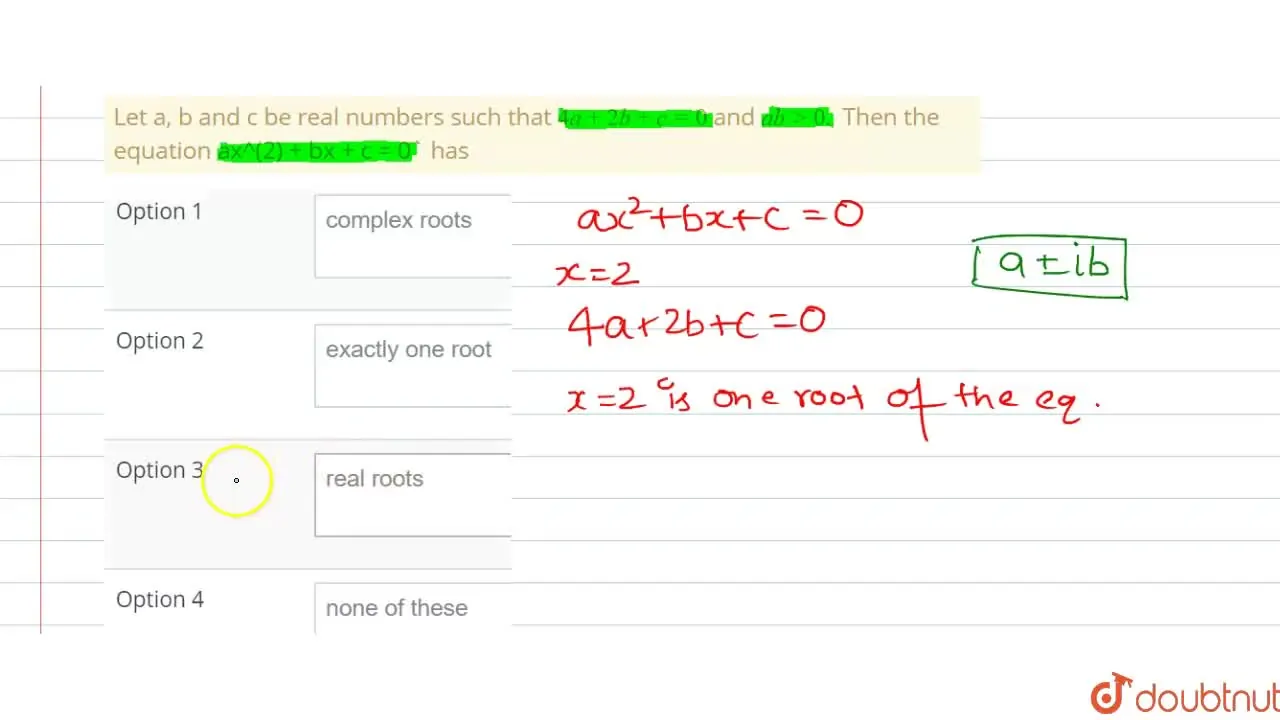Let a, b and c be real numbers such that 4a+2b+c=0 and ab>0. Then the equation ax^(2) + bx + c = 0 has
complex roots
exactly one root
real roots
none of these
The correct Answer is:3
Clearly, x = 2 is a root of the equation and imaginary roots always occur in pairs. Therefore, the other root is also real.
Related Playlists
- BOOK - CENGAGECHAPTER - THEORY OF EQUATIONSEXERCISE - Exercise (Multiple)38videos
THEORY OF EQUATIONS
- BOOK - CENGAGECHAPTER - THEORY OF EQUATIONSEXERCISE - Exercise (Comprehension)37videos
THEORY OF EQUATIONS
- BOOK - CENGAGECHAPTER - THEORY OF EQUATIONSEXERCISE - Exercise 2.139videos
THEORY OF EQUATIONS
- BOOK - CENGAGECHAPTER - STRAIGHT LINESEXERCISE - JEE Advanced Previous Year4videos
STRAIGHT LINES
- BOOK - CENGAGECHAPTER - THREE DIMENSIONAL GEOMETRYEXERCISE - Question Bank20videos
THREE DIMENSIONAL GEOMETRY
Similar Questions
Let a,bandc be real numbers such that 4a+2b+c=0andab<0.Then the equation ax2+bx+c=0.
View SolutionLet a, b and c bereal numbers such that 4a+2b+c=0 and ab > 0. Then the quadratic equation ax2+bx+c=0 has
View Solution20. Let a, b and c be real numbers such that 4a+2b+c=0 and ab>0, Then the equation ax2+bx+c=0 has (A) real roots (B) imaginary roots (C) exactly one root (D) roots of same sign
View SolutionIf a, b, c ∈R and 2a + 3b + 6c = 0, then the equation ax2+bx+c=0 has
View SolutionIf a + b + c = 0 then the quadratic equation 3ax2+2bx+c=0 has
View SolutionLet a,bandc be three real numbers, such that a+2b+4c0. Then the equation ax2+bx+c=0
View SolutionLet a, b, c be real numbers such that a+b+c<0 and the quadratic equation ax2+bx+c=0 has imaginary roots. Then
View SolutionLet a,b,c be real numbers in G.P. such that a and c are positive , then the roots of the equation ax2+bx+c=0
View SolutionIF a,b,c are real distincr numbers such that a3+b2+c3=3abc, then the quadratic equation ax2+bx+c=0 has
View SolutionLat a,bandc be three distinct, positive,numbers such that 2b=a+c, then the equation ax2+2bx+c=0 has
View Solution


